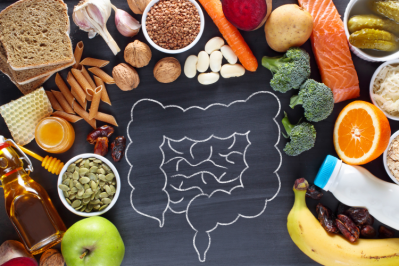Feeding your gut microbiome: Why focus on fibre?

Chances are you are one of the majority of people who don’t get enough fibre in your diet. According to NHS guidelines, the average adult should aim to consume around 30g of dietary fibre a day. But figures from the British Dietetic Association suggest that UK adults are eating just 18g a day. Only 9% of adults actually eat the recommended amount of fibre, noted Sarah Coe, Nutrition Scientist at the British Nutrition Foundation.
But the health the benefits of eating enough fibre are significant and far-reaching. “Fibre is needed for the normal functioning of the gut and helps to prevent constipation and including fibre-rich foods in the diet may help to maintain a healthy weight. Diets rich in fibre are also associated with a lower risk of cardiovascular disease, type 2 diabetes and colorectal cancer,” Coe told FoodNavigator.
Fermentable fibres – dietary carbohydrates that the human gut cannot process on its own, but some bacteria can digest – are an essential source of nutrients that your gut microbes need to stay healthy.
When the bacterial communities that make up your microbiome metabolise fibre, they produce short-chain fatty acids that protect you from diseases of the gut, colorectal cancers and even obesity. In particular, they produce more of a fatty acid called butyrate, which is fuel for your intestinal cells themselves. Butyrate has been shown to improve the gut’s resistance to pathogens, lower inflammation and create healthier cells lining the host’s intestines.
“We’ve evolved to depend on nutrients that our microbiomes produce for us,” explained Zack Holmes, former PhD student at Duke University in the US and co-author on two new papers about fibre. “But with recent shifts in diet away from fibre-rich foods, we’ve stopped feeding our microbes what they need.”

High fibre diets and weight management
The Rowett Institute at the University of Aberdeen is among those working to shed further light on the relationship between fibre consumption, microbiome health and wellness outcomes such as weight management.
The institute has just put out a call for volunteers to participate in a major new diet study funded by the Scottish Government as part of the ‘Healthy Diets for a Healthy Weight’ research theme. The team, led by Professor Alexandra Johnstone, want to look at the link between fibre consumption and obesity.
“Current UK intake is well below fibre recommendations for health, and we are interested to investigate an increase dietary fibre intake to assist with a reduction with ad libitum intake to address the current obesity epidemic,” Professor Johnstone told this publication.
“Studies have shown that the consumption of an additional 14g/d dietary fibre can lead to a 10% decrease in energy intake, in the short term, associated with a small weight loss. Increasing dietary fibre has numerous potential health benefits including body weight, blood sugar and lipids and gut health,” she elaborated, adding that the Rowett team have developed a research plan for the next three years to examine dietary fibre and non-nutritive sweeteners on indices of appetite control and health.
Strategies to boost fibre consumption
If fibre is so important, why aren’t we eating enough of it?
The BNF’s Coe believes various issues contribute to generally low levels of fibre consumption. “There are likely to be many reasons why the UK’s fibre intake is low, but some of the barriers to eating high-fibre foods that have been suggested include assumptions that high-fibre foods are expensive, taste bland or take longer to cook.”
She also sees a lack of awareness of the importance of fibre, which means the nutrient can be overshadowed by other health messaging such as low sugar or high protein.
“Although some people are aware of the role of fibre for digestive health, far fewer know about the full range of benefits of fibre including reducing the risk of type 2 diabetes and heart disease. Awareness of dietary fibre recommendations is also low among most UK consumers,” she observed.
“Many reasons have been suggested to be behind the low awareness of how much dietary fibre is needed for health among consumers. These barriers may include an increased focus on other nutrients in the diet, such as reducing sugar and getting enough protein, as well as no direct information on pack about the proportion as a percentage of their daily fibre requirement that a portion of food provides, although the actual grams of fibre per 100g and per portion can be included on the back-of-pack.”
Coe suggested that we can make some ‘simple swaps’ to increase the amount of fibre we eat. “Fibre-providing foods can be incorporated into the diet across the day by making some swaps and additions to meals, from choosing a wholegrain breakfast cereal and topping with chopped fruit or some nuts, to adding extra vegetables or pulses like lentils to meals and serving with whole wheat pasta, brown rice or potatoes with skins. Snacks that contain foods like fruit, vegetables, nuts, seeds and wholegrain crackers or oat cakes can help increase fibre intake too,” she recommended.

But Professor Johnstone was sceptical about the changes people are able to make on their own. “The obesity epidemic and current cost of living crisis mean that it is challenging to promote healthy and safe diets for all, without promoting diet or health inequalities,” she told us.
For this reason, she says the food industry has an ‘important role to play’ in ‘support healthy and environmentally sustainable food and beverage choices’. “There is a niche to promote whole food options but also re-formulation of current diet staples… There are huge opportunities to promote plant based high-fibre food products that are low-cost and palatable.”
Coe agreed food innovation and communication can help tackle insufficient fibre consumption. “Manufacturers and retailers have a role to play in supporting the population to consume more fibre. Manufacturers have already been developing ways to reformulate existing products, such as bread and other bakery items, breakfast cereals and snack products. Consumers can also be encouraged to choose fibre-rich food through messaging both on pack and in supermarkets.”
Duke University experimental research, recently published in the journal Microbiome, also points to the potential of fibre supplementation to tackle deficiencies.
“Folks who were already eating a lot of fibre, which comes from plants like beans, leafy greens, and citrus, already had very healthy microbiomes,” Holmes said. But the microbiome health of study participants with a lower fibre intake was improved by consumption of fibre supplements.
Duke researchers tested supplementation with three main kinds of fermentable fibre - inulin, dextrin (Benefiber), and galactooligosaccharides (GOS) marketed as Bimuno – to evaluate the impact on microbiome health. “We didn’t see a lot of difference between the fibre supplements we tested. Rather, they looked interchangeable,” reflected study leader Lawrence David, an associate professor of molecular genetics and microbiology at Duke University. “Regardless of which of the test supplements you pick, it seems your microbiome will thank you with more butyrate.”
Source
'Microbiota Responses to Different Prebiotics Are Conserved Within Individuals and Associated with Habitual Fiber Intake'
Microbiome
DOI: 10.1186/s40168-022-01307-x


























